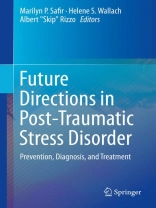Ours is an era of increasing tension, both global and local. And not surprisingly, PTSD is recognized not only in combat veterans and active military personnel, but also disaster and assault survivors across the demographic spectrum. As current events from mass shootings to the debate over trigger warnings keep the issue in the public eye, the disorder remains a steady concern among researchers and practitioners.
Future Directions in Post-Traumatic Stress Disorder presents findings and ideas with the potential to influence both our conceptualization of the condition and the techniques used to address it. A multidisciplinary panel of experts offers new analyses of risk and resilience factors, individual and group approaches to prevention, the evolving process of diagnosis, and effective treatment and delivery. Chapters on treatment allow readers to compare widely-used prolonged exposure and VR methods with innovative applications of cognitive processing therapy and interpersonal therapy. And an especially compelling contribution surveys empirically-based programs relating to what for many is the emblematic trauma of our time, the events of September 11, 2001. Included in the coverage:
- Predictors of vulnerability to PTSD: neurobiological and genetic risk factors.
- Early intervention: is prevention better than cure?
- The functional neuroanatomy of PTSD.
- The development of evidence-based treatment for PTSD.
- Enhancing exposure therapy using D-Cycloserine (DCS).
- PLUS: a case example as seen through five therapeutic perspectives.
While millions experience trauma, relatively few develop chronic PTSD. Future Directions in Post-Traumatic Stress Disorder is a practical and proactive reference for the health and clinical psychologists, sociologists, psychiatrists, and primary care physicians dedicated to further decreasing those numbers.
Cuprins
Part I.PROTECTIVE AND RISK FACTORS FOR PTSD.- 1.Vulnerability to PTSD: Psychosocial and demographic risk and resilience factors.- 2.Predictors of Vulnerability to PTSD Neurobiological and genetic risk factors.- 3.The early adolescent or ‘juvenile stress’ translational animal model of Post-traumatic Stress Disorder.- 4.An Attachment Perspective on Traumatic and Post-Traumatic Reactions.- 5.Delayed onset PTSD in Israel Veterans: correlates, clinical picture, and controversy.- Part II.PREVENTING PTSD.- 6.Cutting Edge Research on Prevention of PTSD.- 7.Systems of care for traumatized children:The example of a school-based intervention model.- 8.Is Prevention Better than Cure? How Early Interventions can Prevent PTSD.- 9.Evolution of PTSD Diagnosis in the DSM.- 10.Functional neuroanatomy of PTSD: Developmental cytoarchitectonic trends, memory systems and control process.- Part III.THE DEVELOPMENT OF EVIDENCE-BASED TREATMENT FOR PTSD.- 11.The Psychopathology and Evidence-Based Treatment for Post-Traumatic Stress Disorder: PE.- 12.Cognitive Processing Therapy: Beyond the Basics.- 13.Interpersonal Psychotherapy for PTSD.- Part IV.MODIFICATIONS OF PTSD TREATMENT.- 14.Inclusion of Virtual Reality: A Rationale for the Use of VR in the Treatment of PTSD.- 15.Development and Dissemination of Virtual Reality Exposure Therapy for Combat Related PTSD.- 16.Virtual Reality as a Tool for Delivering PTSD Exposure Therapy.- 17.Mental Health Problems and Treatment Utilization of Iraq and Afghanistan Veterans Enrolled in Department of Veterans Affairs Healthcare.- 18.Enhancing Exposure Therapy Using D-Cycloserine (DCS) .- 19.Implementation of Evidence-Based Assessment, Treatment, and Research Programs Following the World Trade Center Disaster on September 11, 2001.- Part V.CASE DISCUSSION.- 20.Case Presentation.- 21.Matching Treatment to Patients Suffering from PTSD – What We Know and especially What We Don’t Know.
Despre autor
Marilyn P. Safir is Professor Emeritus, (specializing in Clinical and Social Psychology.) Safir was a founder of, and the second President of the Israeli Association of Cognitive Behavior Therapy, and received its First Award as Outstanding Member in Recognition for the Establishment of and Contributions to CBT in Israel. She also received the Award for Contributions to International Psychology from The American Psychological Association’s Division for International Psychology (52) and was its first recipient as Distinguished Visiting Professor. She was also a founding Fellow of APA’s Division (56) Trauma Psychology, and a founding Fellow of the American Psychological Society (APS).
Helene S. Wallach received her Ph D in Clinical Psychology from the University of Western Ontario, is a certified supervising Clinical Psychologist, a certified hypnotherapist, a certified marital and family therapist. Her teaching and research interests are varied: Forensic psychology – former head of criminology program in a University college, parole committee member, research in jail and in forensic wards in psychiatric hospitals; CBT – supervisor, co-founded a CBT internship program, a CBT post-grad psychotherapy program, as well as research on various aspects; VR – research into presence in VRCBT as well as efficacy of VRCBT; Pain – research into pain alleviation. Helene chaired sessions in conferences and reviewed grant proposals and papers.
Albert “Skip” Rizzo received his Ph.D. in Clinical Psychology from the SUNY-Binghamton and is the Medical Virtual Reality Director at the USC Institute for Creative Technologies. He has Research Professor appointments with the USC Dept. of Psychiatry and the USC Davis School of Gerontology. Skip conducts research on the design, development and evaluation of Virtual Reality (VR) systems for clinical applications. This work spans the domains of psychological, cognitive and motor functioning in both healthy and clinical populations. In 2010, he received the APA D56 Award for Outstanding Contributions to the Practice of Trauma Psychology for his R&D work on VR exposure therapy.












